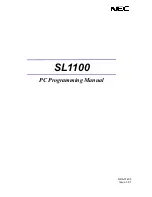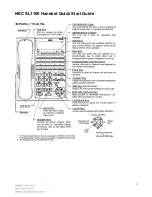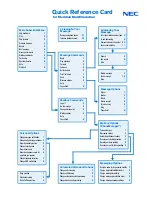
MERLIN LEGEND Communications System Release 5.0
Feature Reference
555-650-110
Issue 1
June 1997
Features
Page 497
Queued Call Console (QCC)
Call Types
3
7
The Call Types option specifies other types of calls that ring into the QCC queue.
The following types of calls may be directed to a specific QCC position with a
specified queue priority level:
■
Dial 0 calls (calls to the QCC operator)
■
Calls to unassigned (invalid) extensions, either received on DID or dial-in
tie trunks or dialed by remote access users
■
Calls to unassigned extensions can be programmed either to receive a fast
busy or to be directed to a backup position. The backup position can be
any individual extension (including one that is not an operator position), the
QCC queue, or a calling group.
NOTE:
Assigning a QCC operator to receive the calls does not cause the
calls to ring into the queue. The calls must be programmed to go to a
backup position, and the QCC queue must be programmed as the
backup position.
■
Calls to the Listed Directory Number (the extension for the QCC queue)
■
Returning calls (unanswered directed, camped-on, held, and QCC
operator-parked calls)
■
Group Coverage calls (the QCC can be designated to receive Group
Coverage calls)
The following types of calls are assigned only a queue priority level. They cannot
be directed to an individual QCC operator position because they are always made
to a specific operator position by the caller:
■
Calls signed in (Follow Me) or forwarded to a QCC operator
■
Calls to a QCC operator extension (for example, calls received from an
inside or remote access user)
■
Calls received on DID or dial-in trunks programmed to reach a QCC
operator’s extension rather than the QCC queue
The factory setting directs the following call types to the primary QCC operator
position:
■
Dial 0 calls
■
Calls to the Listed Directory Number
■
Calls to invalid destinations (unassigned extensions, for example)
Group Coverage calls are not programmed to ring at any specific QCC.
For returning calls, the factory setting returns calls to the originating operator
position (the initiator).
















































